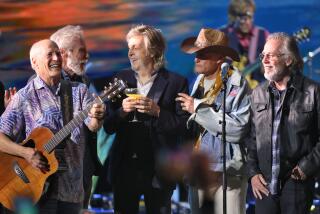Jazz Reviews : Friends Offer Tribute to Warne Marsh at Donte’s
- Share via
There was an odd appropriateness to the fact that the Warne Marsh tribute at Donte’s on Tuesday night took place, so to speak, in jazz time--that floating reality in which schedules, deadlines and appointments lose their significance.
Marsh’s music was like that. The tenor saxophonist, who died last year during a performance on the same stage, was a masterful manipulator of jazz rhythms. Among his many strengths was the ability to turn the time inside out, to refuse to be limited by the perennial obligations of the bar line.
Tuesday night’s program, a warm and friendly gathering of Marsh’s companions and admirers, had a similar feeling of open-mindedness. Starting late and stretching well past midnight, it unfolded with the easy relaxation but intense musicality of a Marsh solo.
Supersax, opening the evening, sounded a bit rougher than usual. Curiously, this somewhat looser feeling, in which one sensed the timbres of the five individual saxophones rather than the more precise but sometimes faceless blend of the section sound, had its appealing qualities.
Two new charts--based on Charlie Parker’s “Au Privave” and “K.C. Blues”--attested to the group’s continuing ability to mine the seemingly endless riches of the Parker legacy. And alto saxophonist Lanny Morgan, soloing on “Ornithology” and “Kim,” confirmed that he is one of the finest be-bop players alive.
A quartet featuring fluegelhornist Stacy Rowles, pianist Frank Strazzeri and guitarist Doug MacDonald was notable primarily for the beauty-and-the-beast interplay between Rowles’ filigree melodies and MacDonald’s brisk, thumb-struck chording.
Trumpeter/singer Clora Bryant followed with several brisk, bop-flavored improvisations, as well as a strikingly unsentimental poem in Marsh’s memory.
Topping off the program, alto saxophonist Gary Foster moved closest of all to the Marsh milieu with a stunning ballad interpretation of “If You Could See Me Now,” and a briskly articulate romp through Lennie Tristano’s (and Marsh’s) “Lennie’s Pennies.”
If the music occasionally had the feeling of Valley jazz--crisp, clean, controlled and very smooth around the edges--well, that was OK. That was, after all, the kind of environment in which Marsh spent most of his life.
Yet Marsh, in his unobtrusive way, usually managed to take chances, to stretch his music and his abilities, no matter what or where he was playing.
As loving and caring as the evening was, one couldn’t help wondering how much more appropriate the tribute might have been if more of the music performed in his memory had taken the kinds of risks that were so intrinsic to Marsh’s musical identity.
More to Read
The biggest entertainment stories
Get our big stories about Hollywood, film, television, music, arts, culture and more right in your inbox as soon as they publish.
You may occasionally receive promotional content from the Los Angeles Times.










